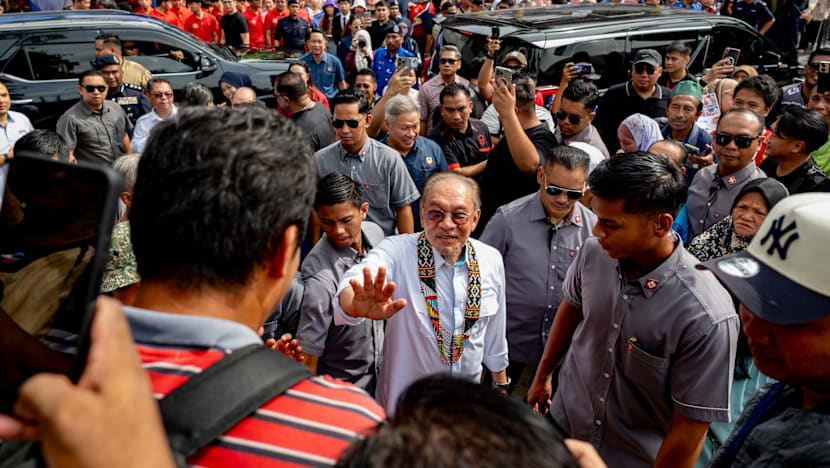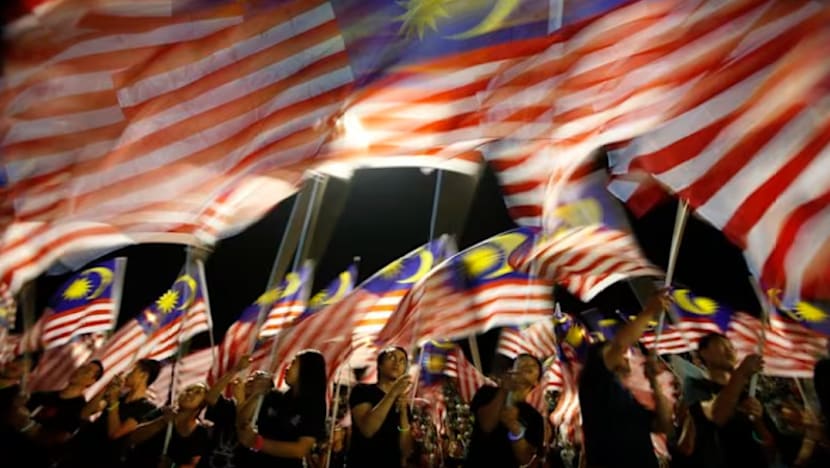'Do not act out of anger': Anwar urges Sabahans to vote based on performance, not race
More than 1.7 million Sabahans are set to head to the state polls on Nov 29, with a record-breaking 596 candidates vying for 73 legislative seats.

Malaysian Prime Minister Anwar Ibrahim gestures during a walkabout at the Gaya Street market in Kota Kinabalu, Sabah on Nov 9, 2025. (Photo: Facebook/Anwar Ibrahim)

This audio is generated by an AI tool.
KOTA KINABALU: Malaysian Prime Minister Anwar Ibrahim has called on voters in Sabah to evaluate candidates based on their track record and competence, rather than racial sentiments or emotions - while also urging a focus on collaboration rather than conflict.
In public comments made on Saturday (Nov 15) that were carried by Malaysian news outlets, Anwar said Sabah needed elected representatives who worked consistently and understood public needs.
Voters should prioritise candidates with clear records in addressing fundamental issues like water, electricity and education especially in rural areas, Anwar added - not those who only appeared during election season.
“Do not act out of anger. Do not follow misguided racial sentiments that will not keep the country safe,” Anwar said in quotes carried by the New Straits Times newspaper, adding that multicultural harmony was Malaysia’s greatest strength in attracting global investment.
“The world looks at us for investment because this country is peaceful. Remember, not many countries have all races, Malay, Chinese, Iban, Kadazan, Murut, Dayak, Bugis, Indian, who can sit together peacefully like this.”
RECORD NUMBERS
The stage is set for the 17th Sabah State Election, with a record-breaking 596 candidates vying for 73 seats as nominations closed on Saturday.
More than 1.7 million Sabahans are set to head to the polls on Nov 29 to cast their votes, with early voting scheduled for Nov 25.
Confirmed candidates include 74 independents, 73 from Parti Warisan, 72 from Parti Impian Sabah, 55 from Gabungan Rakyat Sabah (GRS), 46 from Parti Solidariti Tanah Airku (STAR), 45 from Barisan Nasional (BN), 42 from Perikatan Nasional (PN), and 40 from Parti KDM.
Anwar’s Pakatan Harapan (PH) alliance has fielded 22 candidates for the election.
Sabah's election is the first in a series of noteworthy state polls, with the states of Melaka, Johor and Sarawak up next.
It is shaping up to be a tight race, with multi-cornered contests across the state: four-horse races being the minimum, and one constituency even seeing a 14-way battle.
The polls will be a test of how well the unity government partners can work together even as their collaboration is not a given at the next General Election, political leaders and analysts previously told CNA.
They also believe Anwar is hoping for the Sabah election to produce a Putrajaya-friendly state government that can strike a reasonable agreement on the state’s 40 per cent special grant entitlement.

Anwar also announced more parliamentary seats would be added for Sabah and Sarawak ahead of Malaysia’s 16th General Election, which must be held by 2028.
In his speech on Saturday, Anwar defended his presence in the state - saying he was not there for personal gain, but to fulfil the promise to safeguard the rights and future of Sabahans.
He also said he has never profited from Sabah’s resources, despite more than a decade of holding various government positions.
“I have been a minister for more than 10 years, but I have never taken a single log from Sabah, I have not taken any contracts, and I have not taken any land,” Anwar said.
“I come to look after the people, to carry out the trust.”
Also speaking in Sabah was Malaysian Deputy Prime Minister Ahmad Zahid Hamidi, leader and chairman of the Barisan Nasional (BN) coalition.
Its alliance with PH has provided strategic advantages in this year’s Sabah election, he said, especially in areas with non-Muslim and Chinese majorities, which were previously difficult to penetrate.
“When we collaborate with PH in areas with non-Muslim Bumiputera and Chinese voters, we find that they are more receptive and there is harmony among this Sabah combination to parties that are components of BN and PH,” Zahid told a press conference in Kota Kinabalu on Sunday.















